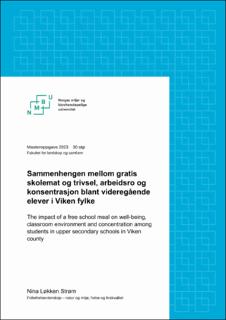| dc.contributor.advisor | Ingeborg Pedersen | |
| dc.contributor.author | Strøm, Nina Løkken | |
| dc.date.accessioned | 2023-07-14T16:27:47Z | |
| dc.date.available | 2023-07-14T16:27:47Z | |
| dc.date.issued | 2023 | |
| dc.identifier | no.nmbu:wiseflow:6839537:54591899 | |
| dc.identifier.uri | https://hdl.handle.net/11250/3078983 | |
| dc.description.abstract | Bakgrunn: Norske barn går på skole i mange år, og skolen kan påvirke barns atferd og kostholdsvaner. Det er vanlig at elever spiser frokosten hjemme og tar med seg matpakke til lunsj på skolen, hvor sammensetningen av næringsstoffer varierer. Skolen er også en viktig sosial arena og kan påvirke unges helse og trivsel. Gratis skolemat er antatt å være et tiltak som kan løse flere utfordringer i samfunnet relatert til kosthold, trivsel og læring. I 2021 ble det gjennomført et prøveprosjekt med gratis skolemat i Viken fylkeskommune, og i forbindelse med det ble det sendt ut en spørreundersøkelse om skolemat før og etter prosjektet.
Hensikt: Hensikten med denne studien var å evaluere skolematundersøkelsen i Viken fylkeskommune, og undersøke om gratis skolemat har en sammenheng med elevers trivsel, konsentrasjon og arbeidsro.
Metode: Det ble brukt kvantitativ metode og designet er tverrsnittsstudie. Utvalget bestod av 6 videregående skoler med elever mellom 15 – 19 år. Det var 3 intervensjonsskoler med totalt 1544 elever, og 3 kontrollskoler med totalt 2107 elever. Data ble innhentet på to tidspunkt med ett års mellomrom, første gang i 2021 og andre gang i 2022. Det ble laget skårer for trivsel og konsentrasjon. Analysene som ble anvendt var krysstabulering, to-utvalgs t-test og multilevel mixed model.
Resultater: Analysene fant ingen signifikant endring i trivsel (p=0,21) eller konsentrasjon (p=0,35) for hverken intervensjon eller kontrollgruppen fra første undersøkelse til andre undersøkelse. Når det gjelder arbeidsro ble det funnet en signifikant økning i arbeidsro for intervensjonsgruppen fra 2021 til 2022, mens kontrollgruppen hadde en nedgang. Interaksjon mellom tid og kontroll/intervensjon for arbeidsro er signifikant (p=0,0002).
Konklusjon: I denne studien hadde ikke gratis skolemat noen sammenheng med trivsel eller konsentrasjon, men det ble funnet en sammenheng med arbeidsro. Det er behov for flere norske studier som studerer gratis skolemat og hvordan det kan påvirke faktorer som trivsel, konsentrasjon og arbeidsro. Det er også nødvendig med forskning som går i dybden på om det er skolematen eller skolemåltidet som en sosial arena som kan ha størst påvirkning på elevenes helse og trivsel. | |
| dc.description.abstract | Background: Norwegian children attend school for many years which can influence children´s behavior and dietary habits. In Norway, it is common for students to eat breakfast at home and bring a packed lunch to school, and the composition of nutrients varies. The school is also an important social arena and can affect children's health and well-being. Free school meals are believed to be a measure that can solve several challenges in society related to diet, well-being, and learning. In 2021, a trial project with free school meals was carried out in Viken municipality, and in connection with that, a survey was sent out about school meals before and after the project.
Objectives: The purpose of this study was to evaluate the school food survey in Viken municipality, and to investigate whether a free school meal impacts students' school enjoyment, concentration, and classroom environment.
Design: A quantitative method was used, and the design is a cross-sectional study. The sample consisted of 6 upper secondary schools with students between 15 – 19 years old. There were 3 intervention schools with a total of 1544 students, and 3 control schools with a total of 2107 students. Data were collected twice with one year in between, first time in 2021 and the second time in 2022. Scores were created for school-enjoyment and concentration. The analyzes used were cross-tabulation, two-sample t-test, and multilevel mixed model.
Results: The analyses did not find a significant change in school enjoyment (p=0,21) or concentration (p=0,35) for either the intervention or the control group from the first to the second survey. The analysis found a significant increase in the classroom environment for the intervention group, while the control group had a decline. The interaction between time and control/intervention for the classroom environment is significant (p=0,0002).
Conclusion: In this study, free school meals had no impact on school enjoyment or concentration, but an impact on the classroom environment was found. There is a need for more Norwegian studies that study free school meals and how they can affect factors such as school enjoyment, concentration, and classroom environment. There is also a need for research that goes in-depth into whether it is the school food or the school meal as a social arena that can have the greatest impact on student's health and well-being. | |
| dc.language | nob | |
| dc.publisher | Norwegian University of Life Sciences | |
| dc.title | Sammenhengen mellom gratis skolemat og trivsel, arbeidsro og konsentrasjon blant videregående elever i Viken fylke | |
| dc.type | Master thesis | |
